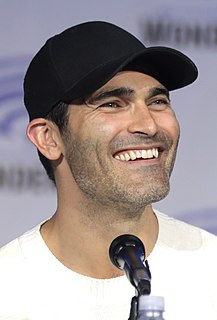A Quote by James A. Michener
I can't remember how old I was, maybe 13, 14, and to see these fellows and hear their stories and to see life come to such a drab ending - my God, a poorhouse in those days was something. You would have to be inert not to respond to it.
Related Quotes
When I listen to Airplanes record, it takes me back. I remember a lot of my thought processes when I was 20 or 21, writing those songs and recording that record. I wonder what I was thinking when I was trying to say a particular thing. I hear some of the weird little nuances in the recording; I can hear what the room sounded like. I remember what it smelled like. I can remember sitting up in guitarist Chris Walla's bedroom and for the first time in my life having this realization like, "Maybe I can do this. Maybe I can make music that in some capacity people will enjoy and come see me play."
I love telling stories, I love for someone to see something, and go, "Oh, wow, I've never thought of it that way." Because I've had those moments in my life, where I go, "Oh, my God, I've never looked or approached this topic and had that insight or had that idea come to mind," to where it changes your life, it changes the way you see certain things. I love that. I think that's such a cool thing that we get to do by sharing stories, whether they're fiction or nonfiction.
My father has always prayed that his words would reflect God's standard of truth as the basis to claim, 'I have given them Your word' (John 17:14). In this book, I believe you will see that he has faithfully spoken God's Word that quenches the thirst of those seeking to draw from the wellsprings of Life. It is highly meaningful to see these statements now collected in one volume.
A friend of mine kept saying, 'You tell all these stories about John, and when you do, you say, 'Wait a minute, I have a photo to go along with that!' How come we never see these photos in a book?' So, I thought maybe it's time to put them out. It would let people see John in that world, through my eyes.
When you talk about the mental health problems, when people come back from war and combat and they see things that maybe a lot of the folks in this room have seen many times over and you're strong and you can handle it. But a lot of people can't handle it. And they see horror stories. They see events that you couldn't see in a movie, nobody would believe it.
Two years ago I focused on one apartment to see how many variations you can come up with in a given space with the same parameters. I would work on this repeatedly for days and you see that there is maybe seven hundred options for one space. This exercise gives you an idea of the degree at which you can interpret the organization of space, it is not infinite but it's very large.
I would like to believe this is a story I’m telling. I need to believe it. I must believe it. Those who can believe that such stories are only stories have a better chance. If it’s a story I’m telling, then I have control over the ending. Then there will be an ending, to the story, and real life will come after it. I can pick up where I left off.
The earliest influence on me was the movies of the thirties when I was growing up. Those were stories. If you look at them now, you see the development of character and the twists of plot; but essentially they told stories. My mother didn't go to the movies because of a religious promise she made early in her life, and I used to go to movies and come home and tell her the plots of those old Warner Brothers/James Cagney movies, the old romantic love stories. Through these movies that had real characters, I absorbed drama, sense of pacing, and plot.





































